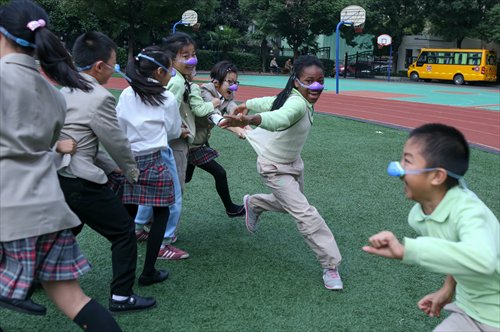HOME >> METRO BEIJING
Armed to the nostrils
By Yin Lu Source:Global Times Published: 2014-11-25 19:13:01
Are nasal masks better than regular air pollution face masks?

Young children wear nasal masks when playing outside. Photo: CFP
For the past several weeks, 25-year-old Beijing art student Amanda Li has lived with a small plastic tube between her nostrils.On each end of the tube are two small filters that are inserted into each nostril. The nose plug is the latest to gain attention in the seemingly interminable line of products that have been rolled out in China to mitigate the harmful effects of the country's notorious air pollution.
"I need to constantly remind myself to breathe through my nose," said Li, who decided to try the contraption after years of being dissatisfied with the way that conventional face masks ruined her makeup.
In recent weeks, nasal masks like the one that Li has been using have attracted attention on Chinese social media and news outlets, with some companies who sell the nasal masks claiming that they are more effective, more comfortable, and more discreet than regular face masks. Besides nose plug styled devices, other companies are offering nasal masks that merely cover the user's nose without the insertion of filters into the nostril.
A keyword search for "PM2.5" and "nose mask" on taobao.com, China's biggest online retailer, currently yields hundreds of items. The most popular of these, retailing for 49 yuan ($8) on the retail platform, has sold more than 1,100 units in the past month, but users have had mixed reactions as to whether claims that the nasal masks are better actually bear out.
"They're more comfortable," said Li. "[But] people are constantly asking me, 'What's that thing in your nose?'"
Besides aesthetic issues, other concerns include the fact that some people breathe through their mouths, and questions over whether nasal masks are effectively sealing out polluted air.
According to a study published in the Journal of Occupational and Environmental Hygiene in 2009, the most significant factor in improving the effectiveness of air masks was not the material used to filter out harmful particles, but whether the masks could eliminate or minimize leakage.
Ethan Nam, a 29-year-old from the US who has been using a nose plug styled mask for the past fortnight, was unsure about the efficacy of the mask in preventing leakage.
"The nose masks are really comfortable. [So] it makes me think the seal is not tight," he said. "I think what's happening is the circular filter is somewhat sideways in my nose which is why it feels like nothing is there when I breathe."
Francis Mushan, a 30-year-old photographer who has been using a non-insertion nasal mask, said that he did not find the nose mask as stuffy as conventional face masks. But he was noncommittal when asked whether they might be more effective in filtering harmful air particles than conventional face masks.
"I'll try anything that could allow me to breathe in less smog, even if it's as little as a mouthful," he said.
Francis Law, the co-founder of a Beijing-based start-up which produces a nose plug styled nasal mask called the Infipure Invisible Air Mask, said in an interview with local magazine the Beijinger last April that balancing effectiveness with comfort and discreetness was one of their customers' biggest concerns and the designers' biggest challenges.
While promotional materials for the nasal mask claim it filters out 99 percent of PM2.5 particles, based on independent third-party lab tests conducted in the US, Law acknowledged that its effectiveness might vary with each user.
Some users are concerned about the possibility of breathing in polluted air through their mouths while wearing a nose mask, but Liu Zeying, a doctor at Beijing Anzhen Hospital's department of respiratory medicine, explained that most of the time people breathe through their noses.
"Mouth-breathing is only for those with colds, nasal polyps, or other sinus and allergy related issues," she explained, adding it is not recommended that those with such conditions wear nose masks.
However, Liu is skeptical about the effectiveness of nose masks for filtering out harmful particles.
"I think [the promotion of the nose products] might be more formed around selling the products rather than actual facts," said Liu, stressing that for the consumers to fully trust the devices, further independent research is still needed to establish whether nasal masks are effective or not.
Posted in: Metro Beijing